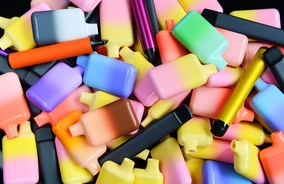There are a lot of reasons not to smoke, and plenty of methods to cut down the amount of cigarettes you get through every week. Saying that, it's not as if you have to do it all at once.
Like any change to your lifestyle, it's something you can find your own path to cutting down, saving yourself a considerable amount of money and avoiding the various health issues smoking brings about - but it's not all about the effect smoking has on your life, but the world around you.
By now, we are all conscious of the effect that our consumption has on the environment. It wasn't that long ago that recycling was a new process only practised by some people - now, it's standard to separate recyclable materials from our trash. However, that doesn't mean that the environment isn't suffering from human waste - especially the oceans.

Fossil fuels lead to ocean acidification, human-generated noise pollution disrupts marine communication, oil and gas drilling release toxic by-products into ocean habitats, and our garbage pollutes the water. Single-use grocery bags, straws, water bottles, and other products amount to eight million metric tons of plastic that won't biodegrade. Staying in the environment, they entangle marine life, are ingested by living creatures, and pollute our beaches.
Now, it has been revealed that cigarette butts contribute much more to this serious issue than we have previously thought. NBC News recently released a report on the irreversible damage done to the ocean, putting the spotlight on cigarette filters. Citing data from the NGO Ocean Conservancy, which has been organising beach cleanups for over thirty years, they revealed that cigarettes are causing serious harm to marine ecosystems.

According to Ocean Conservancy's 2018 report, cigarette butts have been the most collected item on the beaches of the world for 32 consecutive years, with over 60 million collected over this period.
This doesn't just come from beach-goers who dispose of filters directly on the beach, either. Cigarette butts are carried by rain into drains, which lead to rivers, other bodies of water, and the sea - where they can be carried back to beaches by the tide.
Cigarette filters partly consist of cellulose acetate - and seeing as this is a natural product, many have believed that filters are biodegradable. However, once the cellulose acetate is processed, a plastic that isn't biodegradable can be produced.

Once the filters begin to decay - the pollutants they have absorbed from the smoke (substances such as lead, arsenic and nicotine) are released into the environment. In addition to any plastic, these pollutants can then be consumed by sea creatures - and even end up in our food again.
The cigarette industry is reportedly looking at greener solutions for their production cycles, but that doesn't mean smokers can't do their part to help. Other than cutting down on how much you smoke, you can make sure to properly dispose of the cigarettes you do smoke, rather than leaving them to be collected in drains.

